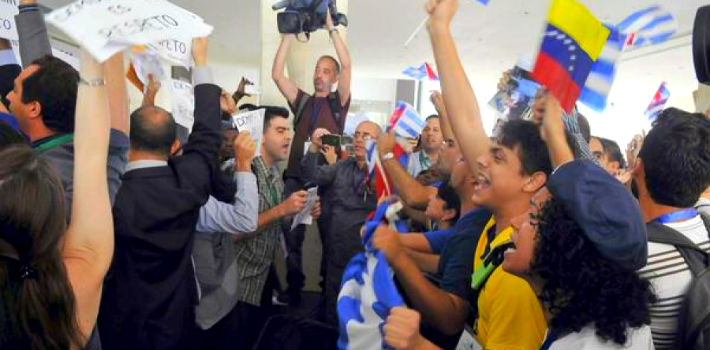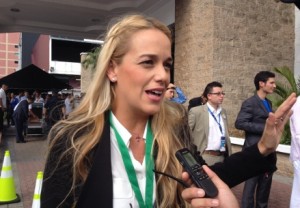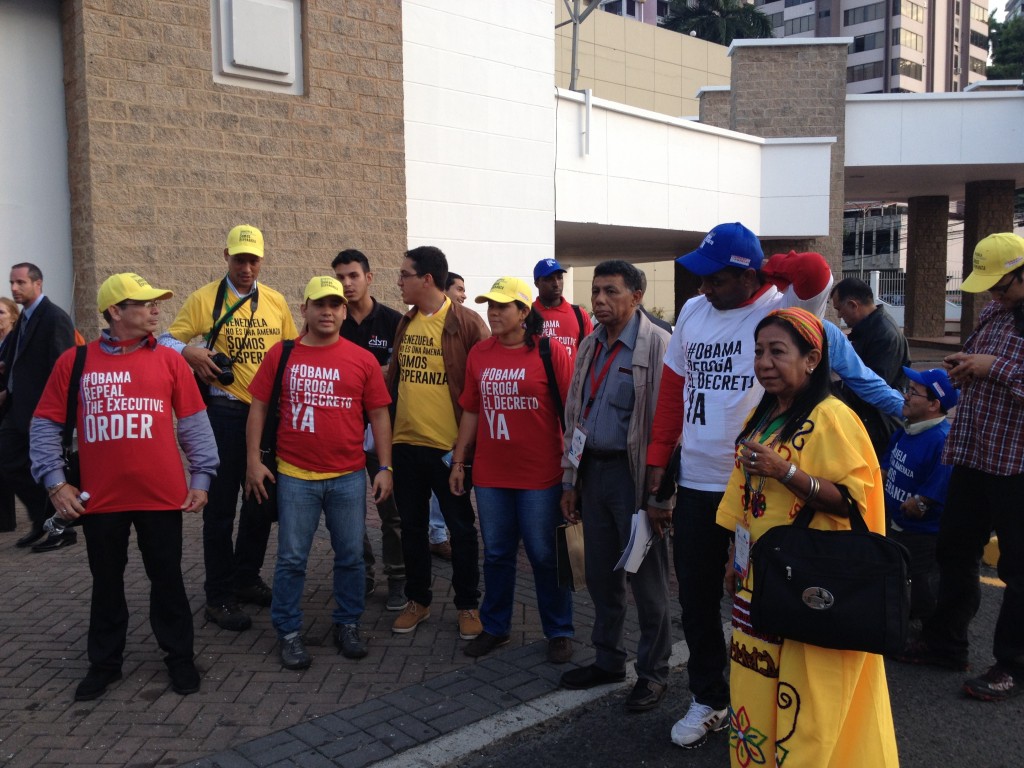
EspañolThe Civil Society Forum of the seventh Summit of the Americas came to naught over the weekend, as participants failed to reach any agreement. Citizen participation and governance were on the table, but representatives from Cuba, Venezuela, Nicaragua, Bolivia, and Ecuador were noncommittal and refused to sign joint resolutions.
Violence Stifles Attempt at Dialogue
Members explained that as well as the impossibility of reaching a consensus, the allegedly violent methods used against them by some official delegates forestalled any opportunity for peaceful dialogue.
Delegates aligned with the Cuban government refused to sit down with opposition activists throughout the Summit. On Friday, roundtable members protested their counterparts’ refusal to enter into discussion with placards reading “democracy is respect”: a move which reportedly led to them being cornered in a hallway by pro-Havana delegates.
According to Rafael Pietro, leader of the Venezuelan NGO Redes por la Vida (Networks for Life), the rival activists kicked and punched the participating civil-society representatives, causing several injuries.
Pietro added that he had filed a report with Panamanian police and identified one of the individuals who began the confrontation. The Venezuelan activist invoked local legislation that allows the expulsion of the foreigners if they commit acts of hatred against humanity or violence.
Arnaldo Rojas, a Venezuelan who attended the Panama Summit to defend his government, explained to the PanAm Post that the Venezuelan opposition activists were “murderers” due to their role in 2014’s protests that led to the death of at least 40 people. Rojas admitted that a fight had broken out between the delegations, but denied being present.
Burning Bridges
Kirenia Yalit Núñez, a Cuban activist with the Commission of Human Rights and National Reconciliation, argued that it was impossible to determine the collective will of the continent’s assembled countries, due to the tactics of “sabotage” applied by certain groups.
“They hijacked the work of all of all the delegates of the continent to focus on their issues with the Cuban and Venezuelan opposition,” Yalit Núñez argued, criticizing claims by attending governments that they were showing “solidarity” with the oppressed of the region.

She further claimed that the Cubans in attendance were clearly linked to the Castro regime, and that they had applied the same methods of intimidation in Panama as in Cuba.
A public melee between Cuban government supporters and pro-democracy activists previously broke out on Wednesday, April 8, apparently orchestrated by Cuban intelligence chief Colonel Alexis Frutos Weeden, who was filmed throwing punches.
Bertha Soler, leader of Cuban civil-society organization Damas de Blanco (Ladies in White), and who participated in the roundtables, argued that opposition groups weren’t given sufficient space to make their voices heard.
Carolina Joly and Victoria Ramírez, members of the Latin American Network of Young People for Democracy (Redlac) for Panama and Ecuador, similarly argued that independent delegates had faced multiple obstacles in entering Panama and signing up to events.
The pair argued that the excess numbers of representatives backed by their home governments should have been limited, and denounced the presence of those such as former Culture Minister Abel Prieto, whom they blamed for being behind the violence.
In comments made to the PanAm Post, Lilian Tintori, the wife of jailed Venezuelan opposition leader Leopoldo López, lamented the failure to use the meetings between opposing viewpoints to build bridges.
She reported that the day before, a group of individuals approached her and accused her husband of advocating violence and causing the murder of their family members in 2014’s protests.
“Right Wing” Call for Democracy
Ana Karina García, a Venezuelan Redlac member, was among those attacked on the sidelines of the Civil Society Forum discussions. She argued that despite the ideological differences between those taking part, the demands forwarded on to the heads of state and OAS secretary general are fundamental for society.

Strengthening democratic institutions in free, multi-party, and transparent elections, protecting the independence of state institutions, guaranteeing the right to public information and the freedom to peaceful protest, and the creation of a permanent inter-American civil-society forum were among the Forum’s requests.
The demands were resisted by many of the pro-government delegates, with Rojas defending his refusal to subscribe on grounds that they amounted to a “right-wing” posture.
The Governance Roundtable, in the absence of representatives from Bolivarian Alliance (ALBA) countries, demanded that the OAS fulfill the role of a guarantor of democracy and human rights in the region.
It also called for an end to the criminalization of protest, and in one of the most controversial points of the debate, demanded the release of political prisoners.
The delegates also called for the creation of a democracy rapporteur attached to the Inter-American Commission on Human Rights (IACHR) to monitor elections and the fulfillment of the OAS Democratic Charter.
Those who refused to subscribe to the resolution issued a “counter-summit” document, in which they asked US President Barack Obama to revoke the executive order which imposed sanctions on seven Venezuelan government officials.
The declarations approved by the majority of delegates were nevertheless read out at Friday’s meeting of the region’s presidents.
Mixed Results
Regional press were also subject to violent episodes during the summit. On Saturday, a bodyguard in Bolivian President Evo Morales’s security detail reportedly punched a Panamanian journalist, and used a Taser on another, for getting too close to the head of state.
The divisions at the Civil Society Forum were also mirrored at the head of state level, with regional leaders failing to agree on a joint-cooperation resolution due to Venezuela’s inclusion of a preamble calling for an end to US sanctions on Venezuelan officials.
Despite regional support for revoking the sanctions — claimed by Morales to be the will of 33 of the 35 nations present — US officials defended the “very, very limited” nature of the executive order, which freezes the US bank accounts and visas of Venezuelan officials linked to 2014’s crackdown on anti-government protests.
A more positive encounter took place in a historic meeting between Obama and Cuban President Raúl Castro on Saturday, where Obama highlighted regional backing for the normalization of relations between Havana and Washington.
In a 45-minute address to the Summit later that day, Castro praised Obama’s “humble” background, and exonerated the US president from responsibility for the 55-year economic embargo of the Caribbean nation.
 Versión Español
Versión Español












